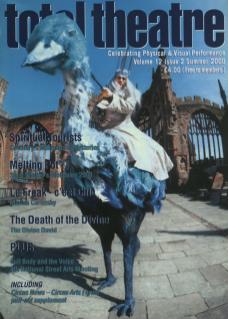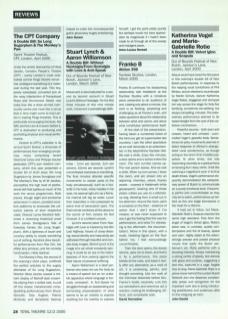Movement is deconstructed to a second by second account in Stuart Lynch's Without Nostalgia. For the first three minutes of this nine-minute work, movement is painstakingly deliberate – 1mm per second, 1cm per second, 10cms per second. Lynch's concentrated exactness is transfixing. The final minutes allocate specific movements to certain parts of the body simultaneously, such as a butterfly in his head, sharp needles in his eyes, his external right arm as a flame, his internal left leg as water. Lynch then resembles a man possessed by some kind of benevolent spirit. The final minute combines all the above to the sound of Tom Jones's It's Not Unusual. It is a brilliant conceit.
Lynch's second piece From Nostalgia with Love is inspired by the film Lost Highway. Issues of cross-dressing, sexual identity and masculinity are addressed through beautiful and complex body images. Behind Lynch is the image of a car wheel constantly spinning. It could be an eye or the relentlessness of time passing against the fixed nature of personal suffering.
Aaron Williamson is a deaf performer who does not use the body as a means of speech but as 'an unstable apparatus where language is furiously contested'. In Anti-Speak he struggles through an exasperating and tormenting physicalisation of what seems to be an inability to express anything but his inability to express himself. I got the point pretty quickly but perhaps would not have appreciated its magnitude if I hadn't been made to sit through all of this sweaty and indulgent piece.

